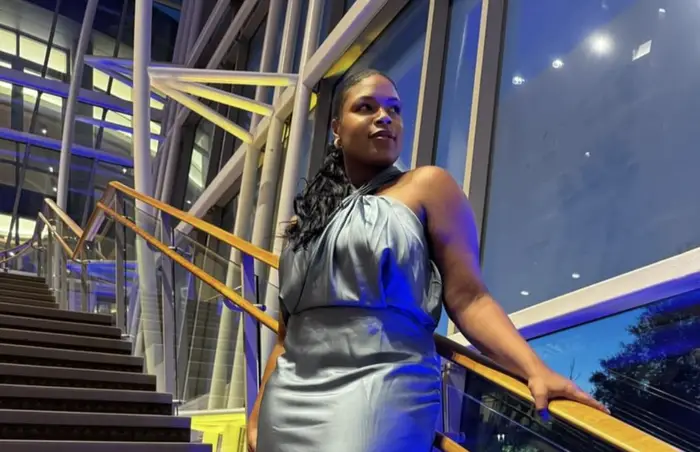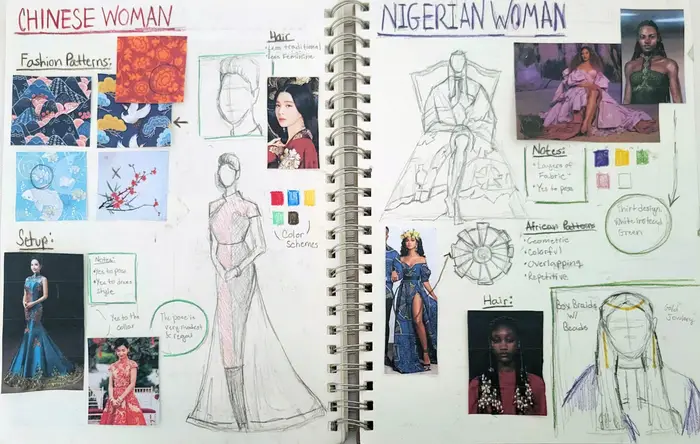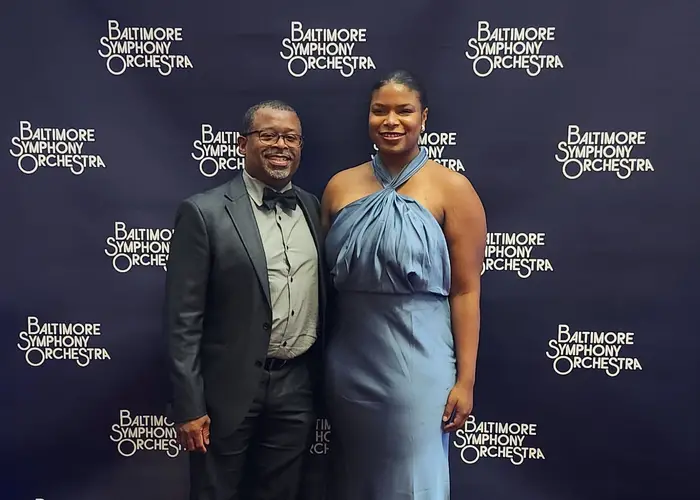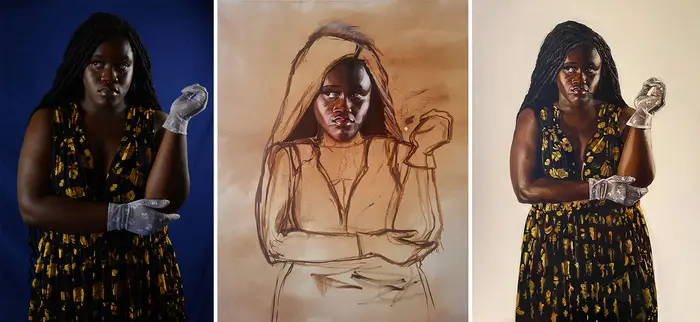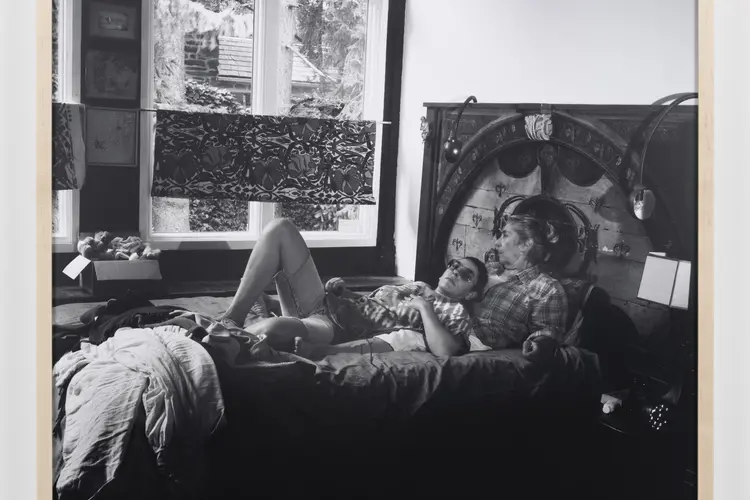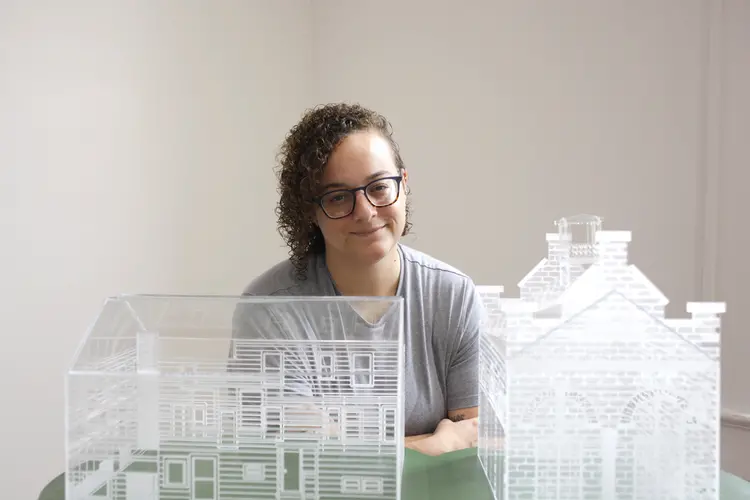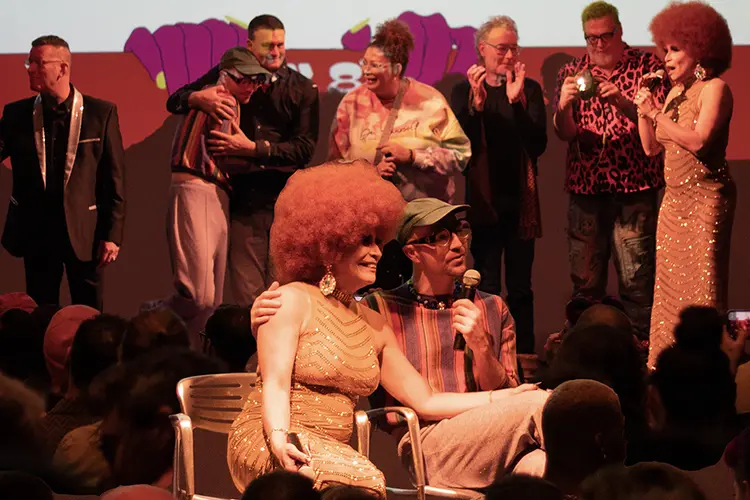
Canvas to Concert: How Sophomore Quinn Bryant’s Paintings Inspired the Baltimore Symphony Orchestra
Media Inquiries
There is power in uniting past and present. It’s a power that Carnegie Mellon University student Quinn Bryant and composer James Lee III both wield — in their own work, as well as in their recent collaboration for the Baltimore Symphony Orchestra(opens in new window). Their collaboration culminated in June 2024 with the world premiere of “Captivating Personas,” Lee’s four-part orchestral piece inspired by Bryant’s canvases, for the orchestra’s 2023-24 season finale.
Raised in Baltimore, Bryant, a sophomore in CMU’s School of Art(opens in new window), has always been deeply connected to community. “I like creating work that tells other people’s stories or is personal to them, while also talking about my own identity,” said Bryant, whose paintings often draw from 18th- and 19th-century portraiture and photographs she takes of models — frequently her own friends. “I loved the title ‘Captivating Personas.’ It so perfectly combined what I was trying to do and what he was trying to do with his music.”
The project began in November 2022 when the orchestra approached Lee(opens in new window), an internationally recognized composer and professor of theory and composition at Morgan State University — the largest of Maryland’s historically Black colleges and universities — with a commission to collaborate with the local community. Lee looked to the Baltimore School for the Arts(opens in new window), where Bryant was in her senior year of high school. During a visit to the school’s studios, Lee was captivated by one of Bryant’s paintings — “Power.”
At 5 feet by 8 feet, “Power” is a monumental reframing of the roles women have played in shaping history, depicting 13 women from diverse cultural backgrounds. Each woman, seated or standing in a room inspired by 18th-century European interiors, assumes a commanding pose, balanced by a sense of shared experience and support. Bryant created playlists for each woman, drawing on music from their respective cultures, and researched fashion history to honor traditional styles while infusing them with a contemporary point of view. She also journaled throughout the two-year journey it took to paint “Power,” a practice that has continued to be central to her process.
“I was reflecting on the past, art history, ancestry, feminism — that was the whole base of my thinking, reflecting on how women have been portrayed, what is beauty and feminism, what it is to be Black and what it is to be a woman,” Bryant explained. “That’s what I tried to do with my piece; take all of the beauty but turn it upside down, honor it, play with it, bring out the good, the bad, the boring, the surprising, all of those different emotions in one piece.”
Lee’s approach to composing was equally ambitious. Anchored by the themes in “Power,” he selected three more of Bryant’s paintings to inspire the movements of “Captivating Personas.”
“My challenge was how to (combine old and new) musically without sounding like a cliché or an imitation of a Mozart, Beethoven or Haydn symphony,” said Lee, who is the composer-in-residence of the orchestra’s upcoming 2024-25 season. “That meant that I needed to combine elements musically to make it interesting, infuse it in such a way that it would be more organic and not contrived.” Where the first movement in “Power” is rich with brass — punctuated by piccolo and clarinet — “Attitude” strikes a lighter tone with marimbas and trombones, followed by a more expressive and expansive third movement of strings, harps, and chimes in “Bored Comfort,” and, finally, a celebratory triumph in “Breath of the Victorian Scape.”
Lee and Bryant’s conversations early on explored the influences behind each painting, from symbols of empowerment to personal stories, while still leaving room for Lee to interpret. The ways in which colors convey emotion helped Lee bridge the realms of painting and music. “We have a word called timbre, where we deal with the idea of colors and sounds,” he said. “Especially writing for orchestra, that lends itself to a wonderful combination of instruments.”
At each performance, audiences not only heard “Captivating Personas,” but also experienced the paintings as they were projected on screens during each respective movement. In the second, “Attitude,” Bryant’s friend and muse Zoey Aleong wore a modern floral dress paired with her grandmother’s church gloves. “One of the things her grandmother would talk to her about was, and that a lot of Black women face, is this idea that we have ‘attitude,’” said Bryant. “That used to be a stigma. We had to lighten our emotions, we couldn’t be too expressive, we couldn’t be too much of anything. But now we own that as our own form of confidence.” Lee translated this shared experience into music by juxtaposing a bluesy sound — “almost like an older Black church environment,” he said — with harmonies and solos across different instruments of the orchestra.
Throughout the week of performances, after Bryant walked out on stage, she would be approached by members of the audience. “There was this one Black woman whose favorite piece was ‘Attitude,’” Bryant shared. “And she said ‘When I saw your painting, I looked at her arms and they looked like my arms.’ I didn’t think about that when creating the work, but when you tell other people’s stories, and people have that reaction, it shows that you’re not alone in the way you’re feeling or how you see yourself. I had so many moments like that with people after performances.”
Bryant said her journey at Carnegie Mellon has been just as surprising, showing how powerful results can emerge across time and artistic disciplines to create something entirely unexpected. As a first-year student coming from the Baltimore School for the Arts, Bryant wasn’t initially sure she could explore the different artistic directions she was interested in. “I think, in my mind, I believed that I had to choose one. But what I’m learning at Carnegie Mellon is that I don’t, and that I can combine so many different things.”
